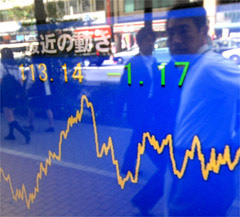 |
 |
 |
 Business News | May 2006 Business News | May 2006  
Dollar Declines On Trade Deficit
 Paul Blustein - Washington Post Paul Blustein - Washington Post


| | A passerby studies the chart of Japanese yen's currency rate against the U.S. dollar outside a Tokyo brokerage Monday. (AP/Katsumi Kasahara) |
The U.S. dollar is having a sinking spell - which is good news for U.S. manufacturers and bad news for American tourists traveling abroad. Spurring the greenback's slide are recent statements by top economic policymakers, notably declarations about the need to reduce global trade imbalances.

The dollar has suffered sharp losses against other currencies the past two weeks, and yesterday it hit a fresh, seven-month low against the Japanese yen. Although it rallied yesterday afternoon against the euro, it fell to an 11-month low against the European currency earlier in the day and is down nearly 6 percent against the euro since late February.

Some of the strongest gains against the U.S. currency have come from the Canadian dollar. The "loonie" rose to 89.82 cents late yesterday afternoon - it was around 85 U.S. cents at the beginning of last month - and at one point yesterday, it touched 89.97 U.S. cents, the highest since 1978.

Like previous swoons in the U.S. dollar, the latest one has come during renewed attention to the U.S. trade deficit, which swelled to $723.6 billion last year and was the focus of discussion at high-level international meetings last month.

The currency shift means that Americans must shell out more dollars for foreign goods while foreigners can buy U.S.-made goods for fewer yen, euros and pounds. That is why U.S. travelers overseas will see their hotel bills and restaurant meals rise in dollar terms and why U.S. exporters are hoping that if the dollar continues its decline, they will get more orders from abroad.

"This could be a trigger to start a slide down," said Franklin J. Vargo, vice president for international economic affairs at the National Association of Manufacturers. "I don't envision a collapse. But everyone's waiting to see - will these steps start a trend? We certainly hope they do."

The dollar's recent move is a reversal of its pattern during much of last year, when rising interest rates made investments in U.S. Treasury bonds and other securities more attractive and drew investors into the U.S. currency. Although interest rates in the United States have continued to head upward, many traders expect rising rates on securities elsewhere - especially Japan and Europe - to narrow the gap. That is especially true since last week's comments by Federal Reserve Chairman Ben S. Bernanke, which were interpreted by financial markets as suggesting that the U.S. central bank would stop raising rates at least temporarily.

Also fueling the dollar's descent were pronouncements last month by officials of the Group of Seven major industrial nations indicating deepening concern about the U.S. trade deficit and the corresponding surpluses in Asia and oil-exporting nations. The trade gap has long been a source of worry for many economists because as Americans buy massive amounts of goods from abroad, the dollars they pay are piling up in the hands of foreign investors, who could eventually lose confidence in the U.S. economy and dump their holdings in a panic.

At the spring meetings of the International Monetary Fund and the World Bank, the G-7 declared their recognition that shrinking the trade gap will require action by many countries, and they created a stir in markets by prodding Asian nations in particular to let their currencies rise. "In emerging Asia, particularly China, greater flexibility in exchange rates is critical to allow necessary appreciations," the G-7 communique said.

In addition to exhorting China to end its system of pegging its currency to the dollar, that statement suggested that the dollar should decline against currencies such as the South Korean won and Indonesian rupiah, and that Asian governments should refrain from their frequent practice of intervening in currency markets. Asian officials have often sought to keep their currencies cheap to give their exporters an extra competitive edge.

"There's a perception in the market - a correct perception, I think - that the [trade gap] is at such a high level that it's been moved to the front burner in U.S. policy," said Steven Englander, chief currency strategist for the Americas at Barclays Capital Inc. in New York. And the policies needed to shrink the imbalance, he added, "mean a substantially weaker dollar."

It is unclear, however, whether Asian countries will abide by the G-7 prescriptions. The steep rise in the Korean won prompted Kim Sung Jin, Korea's deputy finance minister, to warn, "the won's gain is too fast," adding, "We will take appropriate measures if necessary." Some traders have said they think the government may be resuming its previous policy of purchasing massive amounts of dollars to keep the won from moving upward. | 
 | |
 |



